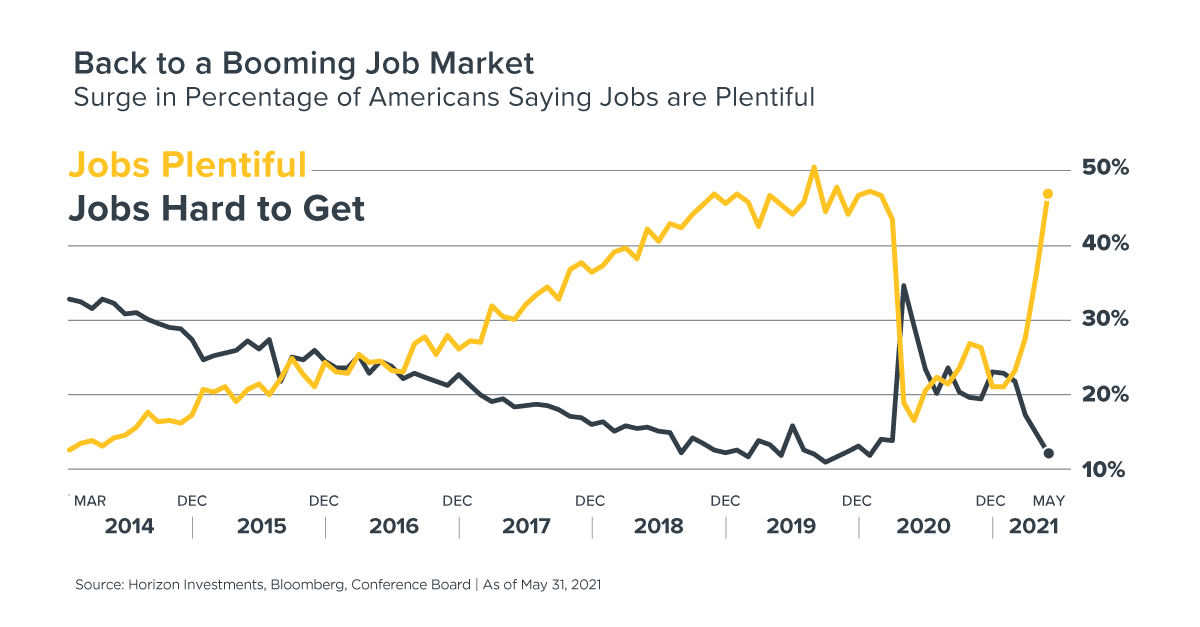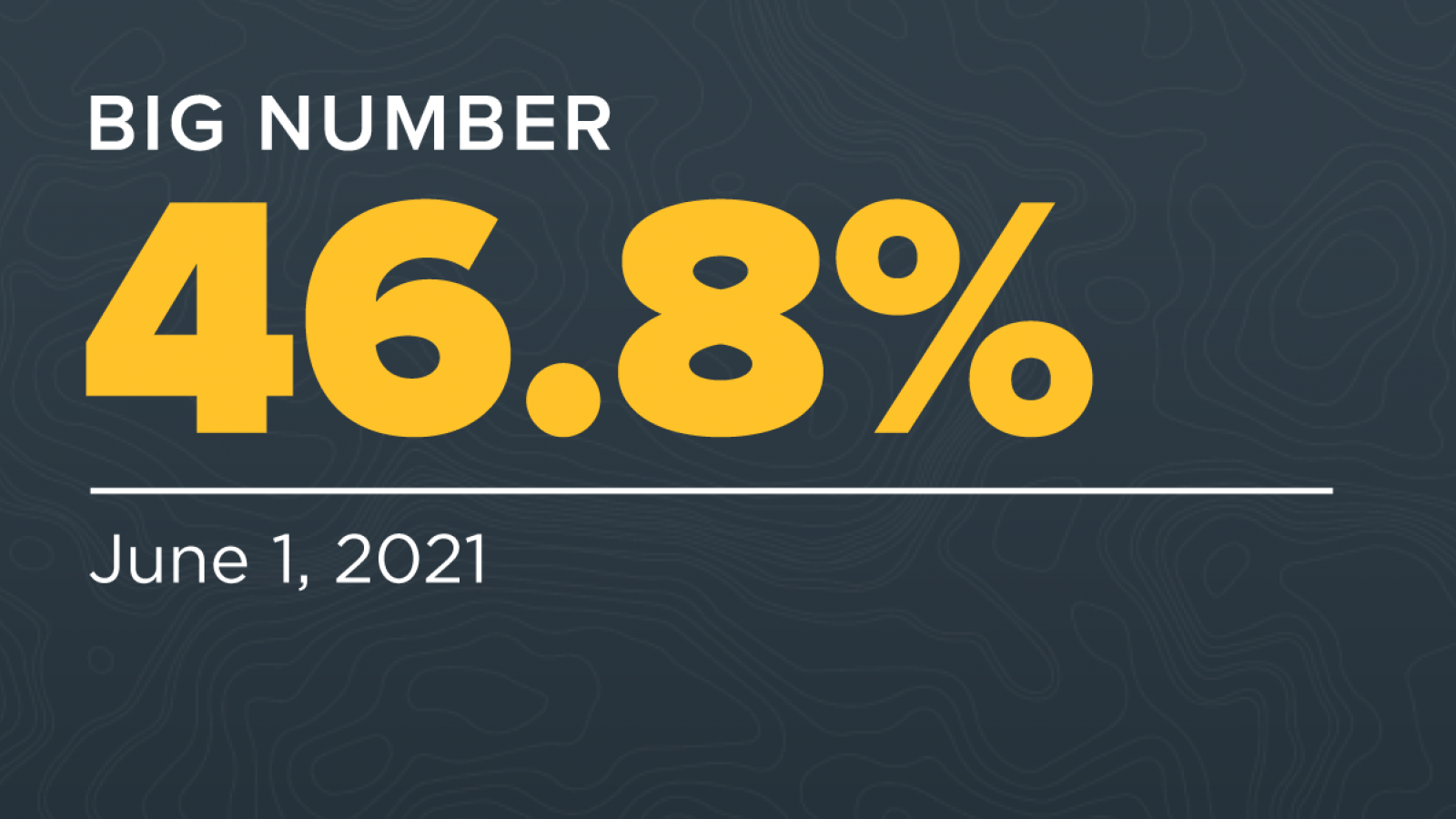The percentage of respondents in the Conference Board’s May survey who said jobs are plentiful is 48.6%.
One corner of the American labor market is back to pre-pandemic levels. The Conference Board’s monthly survey asks whether jobs are plentiful or hard to get, and in May the jobs-are-plentiful response came in at 46.8% versus 36.3% the month before. The spurt higher erases the indicator’s plunge after the U.S. economy was shut down by the pandemic in mid-March 2020.

The surge in the availability of jobs reflects an attempt by companies to re-hire the workers they had to let go last year. The return to pre-Covid levels for the jobs-are-plentiful indicator is a welcome sign that the labor market may be getting closer to the high employment levels that were seen when the pandemic struck.
However, returning to what was considered a normal labor market before the pandemic may be impossible. And the job market indicators investors and economists rely on may need to be updated to reflect an emerging, new reality.
Post-pandemic normal?
Many companies, for example, are sorting out how to mix in-person and remote work, and tackling the difficult question of whether they should make changes to worker responsibilities, compensation and benefits. That will take time and the outcome is far from clear.
Worker productivity is another open question. Remote work during the pandemic gave a lift to worker efficiency.1 Rising productivity, all else being equal, should result in a higher standard of living.
However, it’s far from clear that the productivity increase will last. Research done by the World Bank on the effect of pandemics since 2000 shows they can deplete a labor force, weaken investments in physical capital and disrupt supply chains and innovation.2 The organization’s conclusion is that epidemics ‘’have lowered labor productivity by a cumulative 4% after three years.’’
The effects the World Bank found sound similar to the recent news reports of restaurants, hotels and hospitals finding it difficult to attract workers to fill job openings.3 Manufacturers are finding it hard to hire, too, with one company offering a signing bonus and a three-day work week.4
As for supply chains, there are shortages of key items, whether computer chips or lumber, making it hard to meet the needs of a reopening economy.
Meanwhile, 24 U.S. states are in the process of eliminating an unemployment weekly bonus worth $300 that’s seen by some as causing a shortage of available workers.5 Removing the bonus commits America to a real-time experiment about what’s causing a worker shortage. Money may not be the root of the problem.
Horizon Investments’ view is that financial advisors and their clients should expect the unexpected when it comes to the labor market and other economic data. No one in modern times has experienced a post-pandemic global recovery, so economic predictions have to be taken with a grain of salt, and economic data has to be taken in stride. We believe it is better to focus on the big picture of an improving economy rather than focusing on the potentially bumpy path along the way.
From a behavioral point of view, goals-based financial planning focuses on the goal in hopes that clients will filter out the day-to-day noise that can lead to poor decision-making. Clients’ ability to focus on the long-term has been tested for the past 15 months, and we believe the next few months will continue to be challenging as the U.S. takes a winding road back to a new sense of normal.
To download a copy of this commentary, click the button below.
Further reading:
Does High-Flying Crypto Below Fit Into Goals-Based Financial Plans
Capital Gains Taxes and the S&P 500: Complete Strangers for Over 60 Years
Americans Retiring Early May Benefit from a Goals-Based Solution
Many Investors Tried to Trade the Pandemic Plunge in Stocks
If Inflation Returns, Bond’s Diversification Power May Disappear
Essentially Nothing. That’s How Much Bonds May Return Over Next Five Years
It’s Getting Harder to Fund Retirement Using Bonds
This commentary is written by Horizon Investments’ asset management team. For additional commentary and media interviews, please reach out to Chief Investment Officer Scott Ladner at 704-919-3602 or sladner@horizoninvestments.com.
To discuss how we can empower you please contact us at 866.371.2399 ext. 202 or info@horizoninvestments.com.
Nothing contained herein should be construed as an offer to sell or the solicitation of an offer to buy any security. This report does not attempt to examine all the facts and circumstances that may be relevant to any company, industry or security mentioned herein. We are not soliciting any action based on this document. It is for the general information of clients of Horizon Investments, LLC (“Horizon”). This document does not constitute a personal recommendation or take into account the particular investment objectives, financial situations, or needs of individual clients. Before acting on any analysis, advice or recommendation in this document, clients should consider whether the security in question is suitable for their particular circumstances and, if necessary, seek professional advice. Investors may realize losses on any investments. Index information is intended to be indicative of broad market conditions. The performance of an unmanaged index is not indicative of the performance of any particular investment. It is not possible to invest directly in an index.
Past performance is not a guide to future performance. Future returns are not guaranteed, and a loss of original capital may occur. This commentary is based on public information that we consider reliable, but we do not represent that it is accurate or complete, and it should not be relied on as such. Opinions expressed herein are our opinions as of the date of this document. These opinions may not be reflected in all of our strategies. We do not intend to and will not endeavor to update the information discussed in this document. No part of this document may be (i) copied, photocopied, or duplicated in any form by any means or (ii) redistributed without Horizon’s prior written consent.
Other disclosure information is available at www.horizoninvestments.com.
Horizon Investments and the Horizon H are registered trademarks of Horizon Investments, LLC
©2021 Horizon Investments LLC


